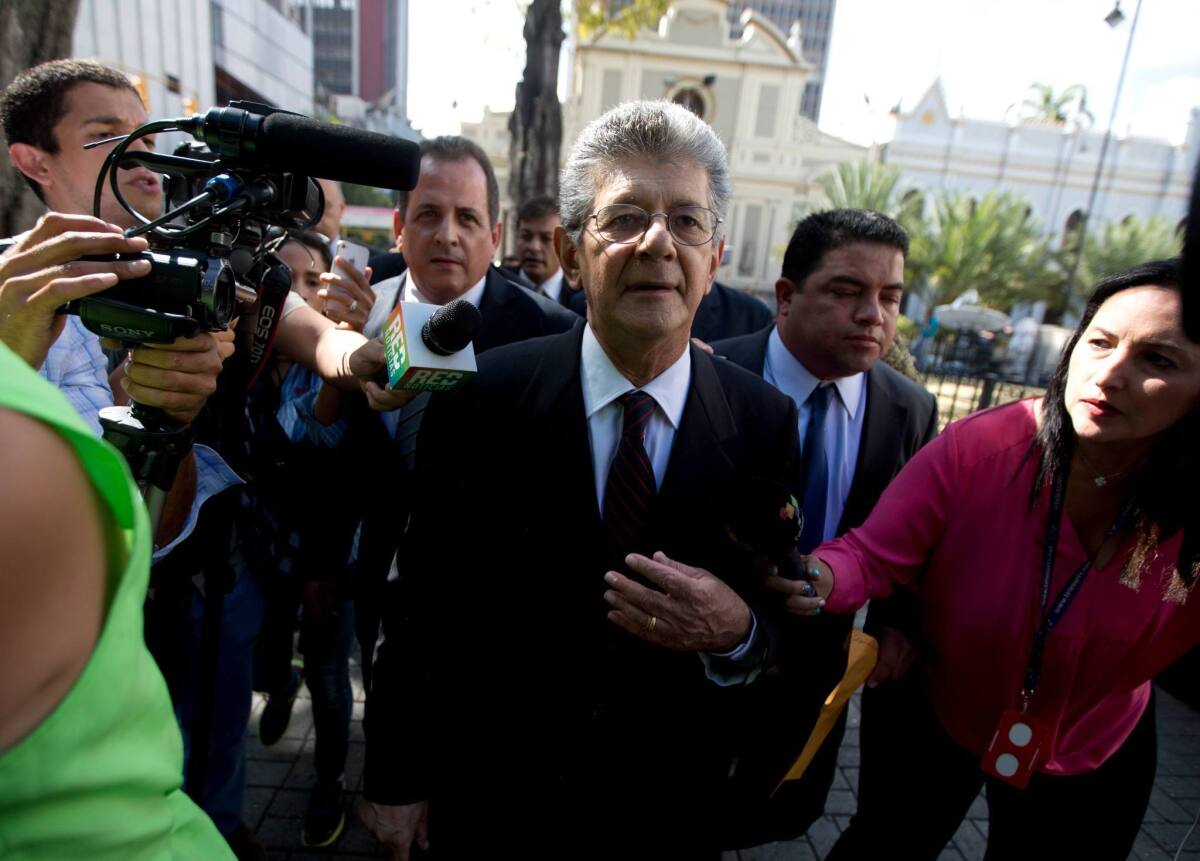Venezuelan opposition says it will try to legally oust President Nicolas Maduro

Henry Ramos Allup, incoming congress president, is surrounded by news media upon his arrival to the National Assembly building in Caracas, Venezuela.
- Share via
reporting from Caracas, Venezuela — In its first day with majority power in Venezuela’s legislature, the opposition coalition of parties Tuesday threw down the gauntlet before socialist President Nicolas Maduro, saying it would try to legally remove him from power within six months.
The declaration from new National Assembly President Henry Ramos Allup came at the end of a raucous day during which opposing sides exchanged catcalls and in which the socialist faction led by former assembly President Diosdado Cabello left the hall en masse before adjournment.
“We will recover our autonomous power, pass laws of amnesty and national reconciliation and look within six months for a constitutional, democratic, peaceful and electoral means of ending [Maduro’s] administration,” Ramos Allup said in his address to deputies.
Although the new assembly president didn’t go into specifics, his mention of an electoral method for removing Maduro was an apparent reference to the use of a recall vote similar to the one opponents unsuccessfully used in 2004 to try to remove late President Hugo Chavez, Maduro’s predecessor.
Ramos Allup asked the armed forces to ensure opposition members’ safety after he was harassed and physically blocked by socialist activists from entering the congress on Monday, but the opening session passed without serious incident.
The new assembly president and other deputies who spoke said the assembly would pass laws to improve an economy dragged down by triple-digit inflation, food scarcities and stagnant growth. The congress will hold Maduro and other officials accountable for what the lawmakers described as inept and corrupt government, he said.
“Apart from the worst reputation, the only two things Venezuela is exporting at the moment is less and less oil ... and increasing numbers of mostly young Venezuelans who are going away to seek livelihoods that their country is incapable of providing,” Ramos Allup said.
In the Dec. 6 assembly elections, opposition candidates won 112 of 167 seats in a landslide victory that gave them a majority in the law-making body for the first time in 16 years.
Because they won more than two-thirds of the seats, opposition candidates also won a supermajority, giving them unusual power. But Maduro’s government has moved to dilute that power by contesting the election of several deputies.
Last week, the supreme court ruled in Maduro’s favor, barring three opposition deputies from taking office, at least temporarily. Critics described the move as a “judicial coup,” but it was unclear Tuesday whether the three would attempt to be sworn in.
U.S. State Department spokesman John Kirby told reporters Monday in Washington that the U.S. was “concerned by the Venezuelan government’s efforts to interfere with the newly elected National Assembly exercising its constitutionally mandated duties.”
In a nationally televised address Monday night, Maduro rejected U.S. criticism and said the new assembly “will be installed in peace respecting the constitution, the laws and all public powers.”
Maduro has made other moves that some say undercut the opposition’s new strength. The outgoing assembly held a special session Dec. 23 to appoint 13 supreme court justices. Critics said that the move was unconstitutional and that the appointive powers for the 32-judge panel should rest with the new assembly.
The president has also moved to limit the new assembly’s broadcast access by shutting down the body’s independent television channel. Sessions will be broadcast over the Maduro-controlled VTV channel and subject to editing and commentary.
The opposition faces a critical hurdle in communicating with voters after Maduro closed down scores of opposition radio and TV stations.
Maduro also used discretionary powers last week to deprive the assembly of its traditional right to name six governors of the central bank. He also announced the formation of a shadow Communal Parliament to “defend revolutionary laws,” although its powers are unclear.
Special correspondents Mogollon and Kraul reported from Caracas and Bogota, Colombia, respectively.
ALSO
1 U.S. service member killed, 2 wounded in Afghanistan
Furor over racist tweet lays bare South Africa’s persistent divide
British law expands definition of domestic abuse to include psychological harm
More to Read
Sign up for Essential California
The most important California stories and recommendations in your inbox every morning.
You may occasionally receive promotional content from the Los Angeles Times.












